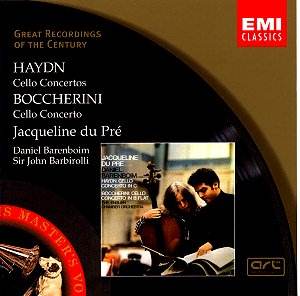Haydn Comparison: Rostropovich/EMI
These Jacqueline du Pré performances have
been classics for decades and now sound better than ever in their
latest remastering. Revered for her passion, technical dexterity,
and architectural sweep, du Pré put forth her best effort
for Haydn and Boccherini in these 1967 interpretations.
I should note that the Boccherini Cello Concerto
in B flat that we listen to is not Boccheriniís original composition.
In 1895, a German composer and cellist by the name of Friedrich
Grützmacher did a major overhaul of the work, giving it a
romantic quality Boccherini never would have known. Grützmacher
made big adjustments to the outer movements and then removed the
slow movement and replaced it with a more intense Adagio from
a different Boccherini concerto. Regardless of its processing,
Grützmacherís arrangement made the B flat Concerto the best
known of Boccheriniís orchestral works.
For those not familiar with these du Pré
recordings, you can expect technical wizardry and great passion
with a Romantic era orientation. EMI Classics has another set
of legendary Haydn Cello Concertos courtesy of Mstislav Rostropovich.
Both are full body performances that might make a dedicated HIP
fan rather uncomfortable. However, Rostropovich and du Pré
are not carbon copies. Rostropovich is not as romantically inclined
as du Pré, delivering a more rugged interpretation of manly
proportions. Although I prefer Rostropovich by a small margin,
itís best to simply note that these two recordings are the cream
of the crop among modern instrument performances taking the traditional
approach. Both conductors direct expertly, but I do find that
Iona Brown places greater priority than Barenboim on moving the
music forward.
The du Pré disc does have a couple of
advantages over the Rostropovich. She doesnít use the wayward
cadenzas of Benjamin Britten, and the Rostropovich offers no music
beyond the two Haydn Cello Concertos.
Haydnís concertos, excepting perhaps for his
Concerto for Trumpet, are not among his most popular compositions.
However, I do feel that the Cello Concertos, particularly the
C major, merit as much attention as the best works from his other
categories. In this context, both the du Pre and Rostropovich
EMI recordings are an essential component of a Haydn enthusiastís
music library. If you only want one of these two recordings, simply
let the degree of your romantic urges guide you to the right disc
for you.
Don Satz
